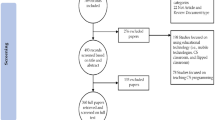Abstract
Integration of computational thinking (CT) into numerous disciplines across the K-12 curriculum is gaining increased attention. In this study, based on the technology integration framework, we investigated how students’ understandings, difficulties, and attitudes towards learning subject matter varied at different levels of CT integration. We implemented six different case studies by integrating CT into six different subjects: science, traffic, language, biology, geography, and physics. Two primary and four secondary school teachers, 38 primary school students, and 113 secondary school students were involved in the study. We categorized these lessons according to the technology integration model: unplugged activities are grouped as augmentation level; robotic and two modeling activities are labeled as modification level; modeling and digital storytelling activities are labeled as redefinition level. Our findings indicate that students reported a very positive attitude toward redefinition level activities. Teachers stated that compared to standard instructional activities, students can go deeper and understand the subject content better in CT integrated lessons.
Access this chapter
Tax calculation will be finalised at checkout
Purchases are for personal use only
Similar content being viewed by others
References
Almeida, R., et al.: iProg: getting started with programming: pilot experiment in two elementary schools. In: 2017 International Symposium on Computers in Education (SIIE), pp. 1–5 (2017)
Baek, Y., et al.: Revisiting second graders’ robotics with an understand/use-modify-create (U2MC) strategy. Eur. J. STEM Educ. 4, 1 (2019)
Barendsen, E., Bruggink, M.: Het volle potentieel van de computer leren benutten: over informatica en computational thinking (2019)
Basu, S., Biswas, G., Kinnebrew, J.S.: Learner modeling for adaptive scaffolding in a computational thinking-based science learning environment. User Model. User-Adap. Inter. 27(1), 5–53 (2017). https://doi.org/10.1007/s11257-017-9187-0
Benitti, F.B.V.: Exploring the educational potential of robotics in schools: a systematic review. Comput. Educ. 58(3), 978–988 (2012)
Bocconi, S., et al.: Developing computational thinking in compulsory education. Eur. Comm. JRC Sci. Policy Rep. (2016)
Brackmann, C.P., et al.: Development of computational thinking skills through unplugged activities in primary school. Presented at the (2017)
Burgett, T. et al.: DISSECT: analysis of pedagogical techniques to integrate computational thinking into K-12 curricula. In: 2015 IEEE Frontiers in Education Conference (FIE), pp. 1–9. IEEE (2015)
Cohen, L., et al.: Research Methods in Education, 6th edn. Routledge, Abingdon (2007)
Cuny, J., et al.: Demystifying computational thinking for non-computer scientists. Work in Progress (2010)
Curzon, P., et al.: Introducing teachers to computational thinking using unplugged storytelling. In: Proceedings of the 9th Workshop in Primary and Secondary Computing Education, pp. 89–92 (2014)
Djurdjevic-Pahl, A., Pahl, C., Fronza, I., El Ioini, N.: A pathway into computational thinking in primary schools. In: Wu, T.-T., Gennari, R., Huang, Y.-M., Xie, H., Cao, Y. (eds.) SETE 2016. LNCS, vol. 10108, pp. 165–175. Springer, Cham (2017). https://doi.org/10.1007/978-3-319-52836-6_19
Grover, S., Pea, R.: Computational thinking in K–12 a review of the state of the field. Educ. Res. 42(1), 38–43 (2013)
Guzdial, M.: Computing for Other Disciplines. Cambridge, UK (2019)
Arastoopour Irgens, G., et al.: Modeling and measuring high school students’ computational thinking practices in science. J. Sci. Educ. Technol. 29(1), 137–161 (2020). https://doi.org/10.1007/s10956-020-09811-1
Jawad, H.M., et al.: Integrating art and animation in teaching computer programming for high school students experimental study. In: 2018 IEEE International Conference on Electro/Information Technology (EIT), pp. 0311–0317. IEEE (2018)
Kafai, Y.B., et al.: A crafts-oriented approach to computing in high school: introducing computational concepts, practices, and perspectives with electronic textiles. ACM Trans. Comput. Educ. TOCE. 14(1), 1–20 (2014)
Kordaki, M., Kakavas, P.: Digital storytelling as an effective framework for the development of computational thinking skills. In: EDULEARN 2017, pp. 3–5 (2017)
Lévano, M., et al.: Methodological framework for the development of computational thinking and programming through experiential learning: case study from schools Juan Seguel and Allipen in Freire, Chile. In: 9th IADIS International Conference, p. 107 (2016)
Looi, C.-K., et al.: Analysis of linkages between an unplugged activity and the development of computational thinking. Comput. Sci. Educ. 28(3), 255–279 (2018)
Lytle, N., et al.: Use, modify, create: comparing computational thinking lesson progressions for STEM classes. In: Proceedings of the 2019 ACM Conference on Innovation and Technology in Computer Science Education, pp. 395–401 (2019)
Nygren, E., et al.: Quantitizing affective data as project evaluation on the use of a mathematics mobile game and intelligent tutoring system. Inform. Educ. 18(2), 375–402 (2019)
Parsazadeh, N., et al.: Integrating computational thinking concept into digital storytelling to improve learners’ motivation and performance. J. Educ. Comput. Res. 59(3), 470–495 (2021)
Peel, A., et al.: Learning natural selection through computational thinking: unplugged design of algorithmic explanations. J. Res. Sci. Teach. 56(7), 983–1007 (2019)
Puentedura, R.R.: Learning, technology, and the SAMR model: goals, processes, and practice. http://www.hippasus.com/rrpweblog/archives/2014/06/29/LearningTechnologySAMRModel.pdf
Tedre, M., et al.: Changing aims of computing education: a historical survey. Comput. Sci. Educ. 28(2), 158–186 (2018)
Thijs, A., Fisser, P., Van der Hoeven, M.: 21e-eeuwse vaardigheden in het curriculum van het funderend onderwijs [21st century skills in the curriculum of fundamental education] (2014)
Wing, J.M.: Computational thinking. Commun. ACM. 49(3), 33–35 (2006)
Yeni, S., Grgurina, N., Hermans, F., Tolboom, J., Barendsen, E.: Exploring teachers’ PCK for computational thinking in context. In: The 16th Workshop in Primary and Secondary Computing Education, 18–21 October 2021 (2021, accepted)
Acknowledgements
This work is supported by The Netherlands Organisation for Scientific Research grant nr. 40.5.18540.153.
Author information
Authors and Affiliations
Corresponding author
Editor information
Editors and Affiliations
Rights and permissions
Copyright information
© 2021 Springer Nature Switzerland AG
About this paper
Cite this paper
Grgurina, N., Yeni, S. (2021). Computational Thinking in Context Across Curriculum: Students’ and Teachers’ Perspectives. In: Barendsen, E., Chytas, C. (eds) Informatics in Schools. Rethinking Computing Education. ISSEP 2021. Lecture Notes in Computer Science(), vol 13057. Springer, Cham. https://doi.org/10.1007/978-3-030-90228-5_1
Download citation
DOI: https://doi.org/10.1007/978-3-030-90228-5_1
Published:
Publisher Name: Springer, Cham
Print ISBN: 978-3-030-90227-8
Online ISBN: 978-3-030-90228-5
eBook Packages: Computer ScienceComputer Science (R0)




